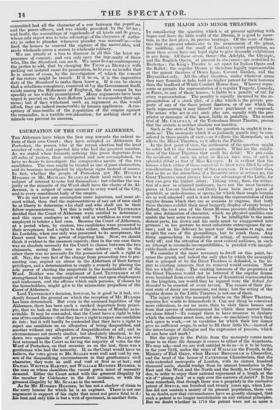• USURPATION OF THE COURT OF ALDERMEN.
THE Aldermen have taken the first step towards the radical re- form of their own Court ; they have accepted as Alderman for Portsoken, the person who at the recent election had the least number of votes, and rejected him who had the greatest number. As we stated when formerly noticing this gross departure from nil rules of justice, then anticipated and now accomplished, we have no desire to investigate the comparative merits of the two candidates. The case might be treated as one of pure abstraction, and its bearings investigated by algebraic signs instead of names. In fact, whether the people of Portsoken get Mr. HUGHES HUGHES or Mr. MICHAEL SCALES as their local ruler, can be a subject of interest to none but themselves : but whether the ma- jority or the minority of the Ward shall have the choice of its Al- derman, is a subject of some interest to every ward of the City, and to every constituent body of the empire. We do not know any assumption more injurious, and more ab- surd withal, than that the representatives of any set of men shall be at liberty to determine who shall and who shall not be their fellow-representatives. Yet this is really what Lord TENTERDEN decided that the Court of Aldermen were entitled to determine; and this upon analogies as weak and as worthless as ever were employed to bolster a bad case. Because the Court of Aldermen, at a period when, by custom, two candidates were presented to their acceptance, had a right to take either, therefore, concluded his Lordship, when one only was presented to its acceptance, the Court must have the power of rejecting him. Now, we should think it evident to the meanest capacity, that in the one case there was an absolute necessity for the Court to choose between the two claimants, seeing there was no other arbiter; while in the other there was no necessity for the possession of such a right at all. Nay, the very fact of the change from presenting two to pre- senting one, argued an abuse in the Aldermen of their former privileges, and a determination to supply a remedy by placing the sole power of electing the magistrate in the householders of the Ward. Neither was the argument of Lord TENTERDEN at all strengthened by the surplusage' of contempt cast upon shopkeepers and tradesmen, and the offence which such persons, if chosen by the householders, might give to the aristocratic prejudices of the Court of Aldermen.
Lord TENTERDEN'S decision, however, be it good be it bad, evi- dently formed the ground on which the reception of Mr. HUGHES has been determined. But even in the assumed legalities of the Aldermen, there has been such a marked departure from princi- ple, that we look on the reduction of the decision of Monday as in- evitable. It may be contended, that the Court have a right to take one of two candidates—that they have a right to reject one candidate in toto; but it will hardly be contended that they have a .right to reject one candidate on an allegation of being disqualified, and another without any allegation of disqualification at all; and in circumstances not merely similar, but absolutely identical, to lay down two opposite rules of procedure. When Mr. SCALES was first returned to the Court as having the majority of votes for the Ward of Portsoken, on that occasion as on the last, there was a gentleman who had the minority. If, as the Court would have us believe, the votes given to Mr. SCALES were null and void by rea- son of the disqualifying circumstances in that gentleman's civil character, they were as null and void at first as at last; and DANIEL WHITTLE HARVEY, not WILLIAM HUGHES HUGHES, IS the man on whose shoulders the vacant gown must of necessity descend. Either the Court acted, with the grossest illegality by the member for Colchester in the first instance, or with the grossestillegality by Mr. SCALES la the second. As.for Mr. HUGHES HUGHES, he has not.a shadow of claim to the sorry honour for which he is an aspirant. There is not one argument in support of his right that must not prove fatal to it : Jams lestand only title is but a writ of ejectment, in another form.






























 Previous page
Previous page